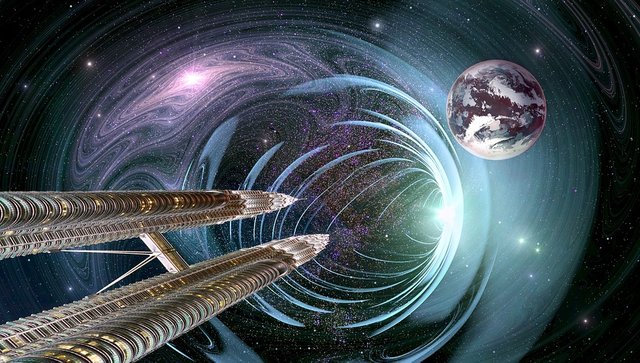If the Universe Is Not Expanding
So far our understanding of the origin of the universe has been based on the concept that the universe was born through a process of 'big bang', at some time in the past.
But is that true? Science is always based on justification based on observational facts. However, to get that justification, then science is always open to interpretations that can be completely different.

As already understood today, how astronomy describes the universe is derived from the light emitted from the atoms of celestial bodies, displayed in color, or frequency, is popularly referred to as the redshift.
If any matter moves away, then from the Doppler Principle, the color will tend to be redder, or lower frequency, of the electromagnetic spectrum. This basic principle is used by the pioneers of the theory of 'big bang', such as Georges Lemaître who formulate the mathematics, while Edwin Hubble observes that indeed the galaxies undergo a redshift, the farther the galaxy, the more experienced spectral distraction. From this, it is deduced that the universe undergoes development, as we have received today.
What if, instead of the universe expanding - as we have received today does not happen, but the mass of everything in the universe has increased? Such interpretations can help provide a better understanding of the problems faced by Cosmology today. Although still necessary to support the observable hill of the theory, but the theory presented by Christof Wetterich, a theoretical physicist from the University of Heidelberg seems quite interesting because the theory of physics is quite valid.
As has been said, that light is the result of the interaction of the constituent atoms of matter, it is used by Wetterich to construct his theory. The characteristics of light emitted by atoms are also influenced by the mass, as well as with the electrons in the atom. Imagine if the atoms increase in mass, the emitted photons become more energized, and since the energy corresponds to the frequency, the larger the mass, the more the blue shift of the observed spectrum, compared to the previously known state, ie, before the mass increases, and vice versa.
Then, because the speed of light is finite, we see the distant galaxies as we see them in the past when light begins to emit from its source. When the mass of the time is low, and then increases, the color of the old galaxy will experience a redshift compared to its current frequency, and the amount of redshift will be proportional to its distance to Earth. Thus, the redshift of the galaxy will display the phenomenon as if they are experiencing a shift away (though not necessarily so).
The work Wetterich undertook was purely a mathematical concept for interpreting redshifts, but his physical meanings would be entirely different from those we understand from the 'big bang' model. Imagine if it turns out that instead of the Semitic nature beginning from the 'big bang', it does not happen at all, but there is no beginning of the universe, even the universe tends to be static, even collapse.
But how can we test this model? How can we measure that the mass expands? One kilogram is an agreed mass, measured and scaled based on predetermined standard units, wherever in the entire universe it will apply. How do we say a kilogram has increased? Although mathematically it is okay, it will not be easy to test.
Nevertheless, Wetterich's theory is not necessarily rejected, because his theory is valid enough, and so can be a foothold when other models of the universe are to be proposed, even further, open up insights, and lead us to explore the possibilities -possible possibilities, which we do not yet understand, and out of the comfort zone of our established knowledge, which still leaves many questions.
Best Regard @t4r1
Reference:
https://educheer.com/the-different-theories-of-how-the-universe-was-created/
http://www.hawking.org.uk/the-origin-of-the-universe.html
https://www.toppr.com/bytes/studying-the-origins-of-the-universe/
https://www.nap.edu/read/6024/chapter/3
https://en.wikipedia.org/wiki/Scientific_theory
Very interesting point of view
What an interesting take on the topic! Now I've a good excuse for why I keep getting heavier as I get older :P
Yeah, questions like if the world is really expanding.
This leaves me quite stunned. Such a brilliant point of view you've exhibited here. Kudos!
Congratulations @t4r1! You received a personal award!
Click here to view your Board
Do not miss the last post from @steemitboard:
Vote for @Steemitboard as a witness and get one more award and increased upvotes!
Congratulations @t4r1! You received a personal award!
You can view your badges on your Steem Board and compare to others on the Steem Ranking
Do not miss the last post from @steemitboard:
Vote for @Steemitboard as a witness to get one more award and increased upvotes!